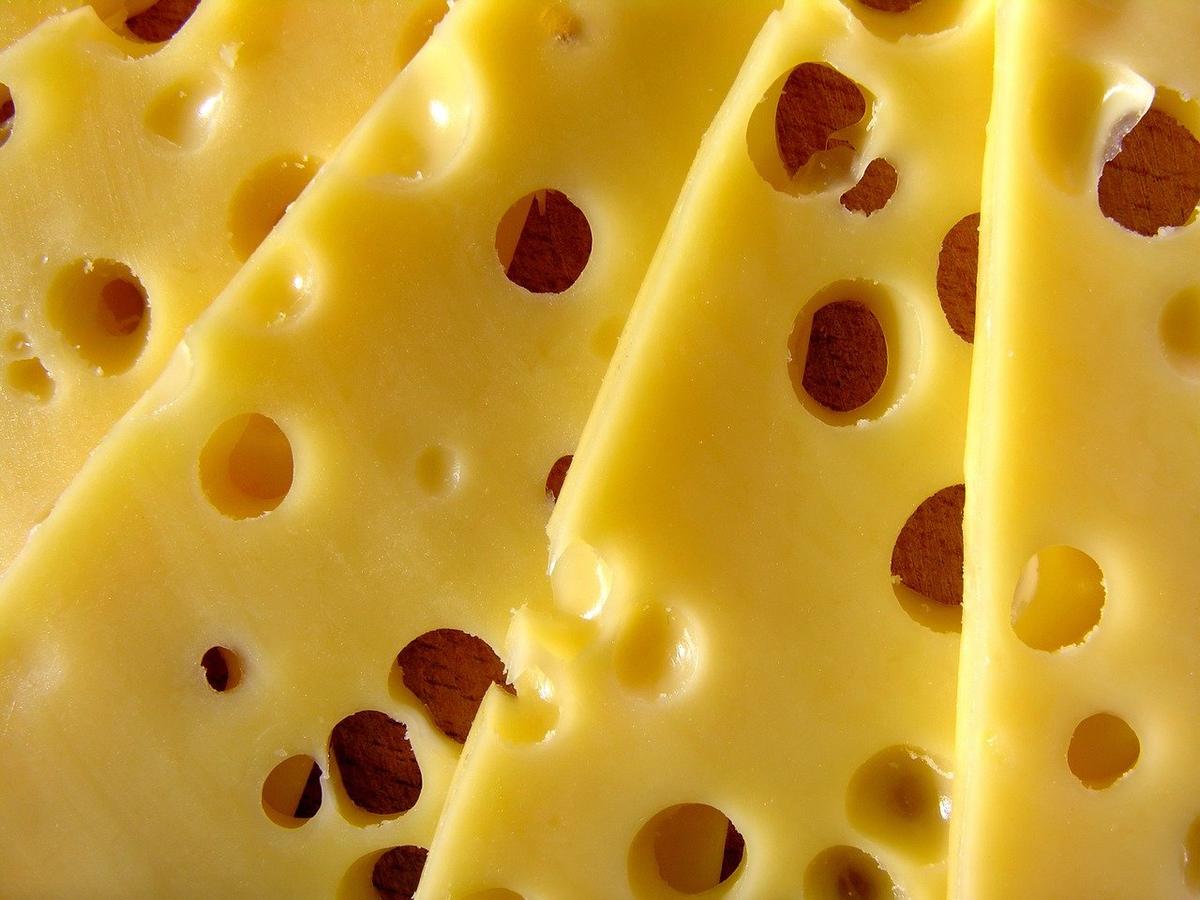Swiss court to rule whether holes in Emmental cheese are too small

One of Switzerland’s most iconic cheeses — the Emmentaler — is in a hole, and now a court must rule on its fate.
Swiss cheesemakers have faced some tough challenges in the past few years: first, a US court ruled that ‘Gruyere cheese’ does not have to come from the Gruyères region — or, for that matter, from Switzerland — in order to bear the name.
And now another court, this time in Switzerland, must decide on the fate of yet another Swiss cheese.
What is happening?
The tell-tale holes of the Emmentaler cheese — so called because it is produced in the Emmental valley in the Bernese Oberland — are shrinking.
The regulatin holes, according to the Emmentaler Switzerland association, must be ‘cherry-sized’ — that is, between 2 cm and 4 cm in diameter.
Now, however, they are more the size of the stone in a cherry.
The cause of this shrinkage is modernisation.
In the past, when cows were milked by hand, hay dust (fine particles from hay) got into the milk. As unappetising as it may sound, bacteria that formed in the process produced gases, which led to the characteristic holes.
However, since modern milking machines have been used, the holes have shrunk because the machines tap the milk from the udder so cleanly that fewer hay particles get into the milk.
That is a problem because the smaller the holes in the cheese, the more likely it is that cracks and fissures will form.
Foreign cheese producers prevent this from happening by simply adding hay dust to the milk, which is why German and French Emmentalers have much larger holes. (Of course, the Swiss argue that those cheeses are not ‘real’ Emmentalers, as they didn’t come from the right region in Switzerland).
Be it as it may, in Switzerland's rules are stricter, and the use of such additives in Emmentaler is banned.
Cheesemakers have submitted a request to the Federal Office for Agriculture (FOA) to change the existing rules.
The request was denied on the grounds that the use of additives would lead to an “industrialisation of Emmentaler”.
Cheesemakers then appealed to the Federal Administrative Court where they faced their foes from FOA again.
The government department continued to argue against the additive, pointing out that, despite smaller holes, the cheese’s quality is good, so the hay powder is not necessary.
Also, they said that the use of this additive is not a part of a traditional manufacturing process, and Emmentaler must be different from industrialised large-hole cheeses.
The lawyer for the Emmentaler Switzerland consortium, however, countered that the FOA’s argument is full of holes.
“The Emmentaler’s characteristic holes must be preserved,” he said. “If we do nothing, they will disappear altogether.”
The court has not yet handed down its decision.
READ ALSO: Why is Switzerland so obsessed with cheese?
Comments
See Also
Swiss cheesemakers have faced some tough challenges in the past few years: first, a US court ruled that ‘Gruyere cheese’ does not have to come from the Gruyères region — or, for that matter, from Switzerland — in order to bear the name.
And now another court, this time in Switzerland, must decide on the fate of yet another Swiss cheese.
What is happening?
The tell-tale holes of the Emmentaler cheese — so called because it is produced in the Emmental valley in the Bernese Oberland — are shrinking.
The regulatin holes, according to the Emmentaler Switzerland association, must be ‘cherry-sized’ — that is, between 2 cm and 4 cm in diameter.
Now, however, they are more the size of the stone in a cherry.
The cause of this shrinkage is modernisation.
In the past, when cows were milked by hand, hay dust (fine particles from hay) got into the milk. As unappetising as it may sound, bacteria that formed in the process produced gases, which led to the characteristic holes.
However, since modern milking machines have been used, the holes have shrunk because the machines tap the milk from the udder so cleanly that fewer hay particles get into the milk.
That is a problem because the smaller the holes in the cheese, the more likely it is that cracks and fissures will form.
Foreign cheese producers prevent this from happening by simply adding hay dust to the milk, which is why German and French Emmentalers have much larger holes. (Of course, the Swiss argue that those cheeses are not ‘real’ Emmentalers, as they didn’t come from the right region in Switzerland).
Be it as it may, in Switzerland's rules are stricter, and the use of such additives in Emmentaler is banned.
Cheesemakers have submitted a request to the Federal Office for Agriculture (FOA) to change the existing rules.
The request was denied on the grounds that the use of additives would lead to an “industrialisation of Emmentaler”.
Cheesemakers then appealed to the Federal Administrative Court where they faced their foes from FOA again.
The government department continued to argue against the additive, pointing out that, despite smaller holes, the cheese’s quality is good, so the hay powder is not necessary.
Also, they said that the use of this additive is not a part of a traditional manufacturing process, and Emmentaler must be different from industrialised large-hole cheeses.
The lawyer for the Emmentaler Switzerland consortium, however, countered that the FOA’s argument is full of holes.
“The Emmentaler’s characteristic holes must be preserved,” he said. “If we do nothing, they will disappear altogether.”
The court has not yet handed down its decision.
READ ALSO: Why is Switzerland so obsessed with cheese?
Join the conversation in our comments section below. Share your own views and experience and if you have a question or suggestion for our journalists then email us at [email protected].
Please keep comments civil, constructive and on topic – and make sure to read our terms of use before getting involved.
Please log in here to leave a comment.